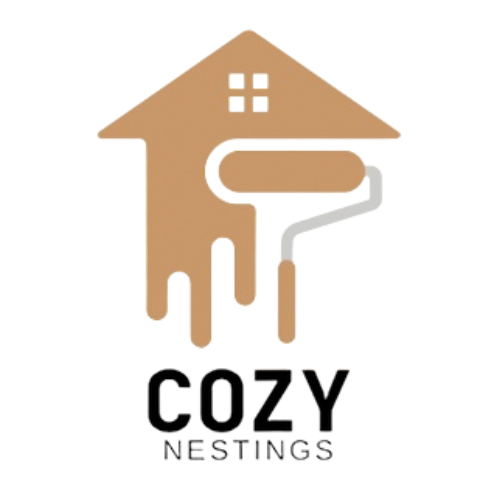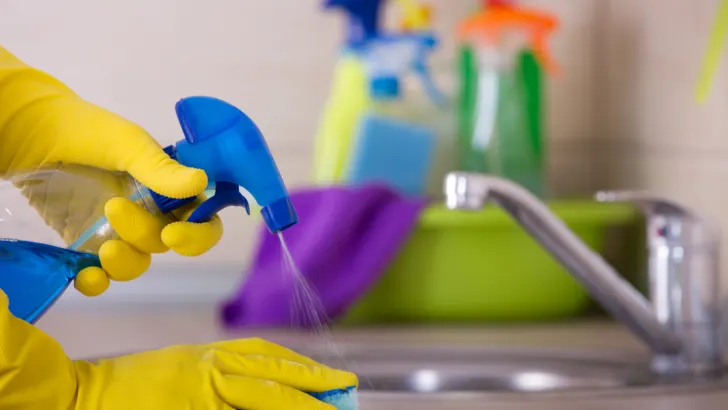
Kitchen Chemistry: Can Bathroom Cleaner Double Up?
Kitchen Cleaning: Can I Use Bathroom Cleaner in the kitchen Safely?
As someone who likes to keep their home clean and tidy, I have always wondered if it is okay to use bathroom cleaner in the kitchen. I mean, both rooms have surfaces that need cleaning, so why not use the same cleaner for both? However, I have also heard that bathroom cleaners are not suitable for use in the kitchen. So, which is it? Can you use bathroom cleaner in the kitchen or not?
To get to the bottom of this, I did some research and found that the answer is not as straightforward as I thought. While some people may use bathroom cleaner in the kitchen without any problems, it is generally not recommended. This is because bathroom cleaners are formulated differently from kitchen cleaners and may contain stronger chemicals that are not suitable for use in areas where food is prepared.
In this blog post, I will explore the reasons why bathroom cleaner should not be used in the kitchen, as well as provide some alternatives that are safe and effective for cleaning kitchen surfaces. Whether you are a busy parent, a professional chef, or like me, just someone who wants to keep their kitchen clean and hygienic, this post will provide you with the information you need to make informed decisions about the products you use in your home.
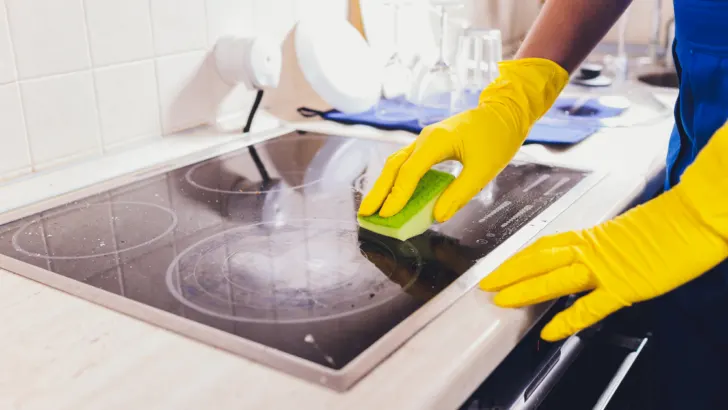
Cleaner Crossover: Exploring Bathroom Products in the Kitchen
Why This is a Common Question That People Have – Can I Use Bathroom Cleaner in the kitchen?
When it comes to cleaning our homes, we all want to make sure that we are using the right cleaning products for the right surfaces. This is especially true when it comes to the kitchen and bathroom, two areas of the home that require regular cleaning to keep them hygienic and safe for use.
It’s not uncommon for people to wonder if they can use bathroom cleaner in the kitchen, or vice versa. After all, both areas of the home require similar cleaning tasks, such as wiping down surfaces, cleaning sinks, and disinfecting countertops. However, it’s important to note that bathroom cleaners and kitchen cleaners are formulated differently, and they are designed to be used on specific surfaces.
One reason why people may wonder if they can use bathroom cleaner in the kitchen is because they may not have a specific kitchen cleaner on hand. In this case, it’s important to know that using the wrong cleaner can damage surfaces or even pose a health risk. For example, bathroom cleaners often contain strong chemicals such as bleach and ammonia, which can be harmful if ingested or inhaled.
Another reason why people may wonder if they can use bathroom cleaner in the kitchen is because they may think that all-purpose cleaners can be used interchangeably. However, it’s important to read the labels of cleaning products carefully and follow the instructions for use. Using the wrong cleaner on a surface can cause damage or leave behind residue that can be difficult to remove.
Overall, it’s important to use the right cleaning products for the right surfaces to ensure that your home is clean and safe. While it may be tempting to use a bathroom cleaner in the kitchen, it’s best to use a kitchen cleaner that is specifically formulated for use on kitchen surfaces.
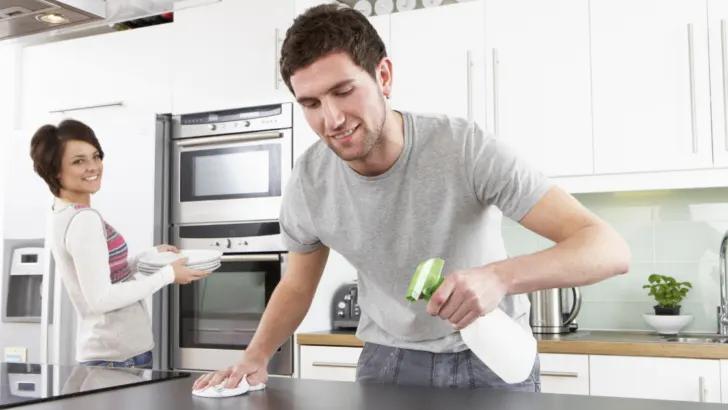
Dual-Use Dilemma: Bathroom Cleaner in the Kitchen
Lets dive in!
As someone who is passionate about keeping my home clean and tidy, I have often wondered, can I use bathroom cleaner in the kitchen and is it safe to do so. After conducting some research, I have found that while bathroom cleaner can be effective in cleaning tough messes on tile and porcelain surfaces, it is not recommended for use on food preparation surfaces.
If you’re like me and want to keep your kitchen clean and safe for food preparation, it’s important to know that there are alternative cleaning solutions available. For example, vinegar and baking soda are natural and effective cleaners that can be used on a variety of surfaces, including countertops, sinks, and appliances. Simply mix equal parts vinegar and water in a spray bottle, or create a paste with baking soda and water, and apply to the surface you wish to clean.
In addition to natural cleaners, there are also a variety of kitchen-specific cleaning products available that are safe for use on food preparation surfaces. These products are formulated to remove grease, grime, and other tough stains without leaving behind any harmful chemicals or residues.
Overall, while bathroom cleaner can be effective in cleaning certain surfaces in the kitchen, it is not recommended for use on food preparation surfaces. By using alternative cleaning solutions or kitchen-specific cleaning products, you can ensure that your kitchen is clean and safe for food preparation.
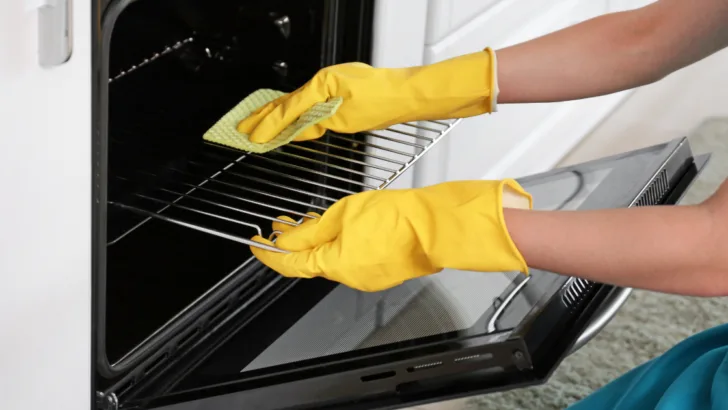
Cross-Cleaning Contemplation: Bathroom Cleaner for Kitchens?
Looking at Different Types of Bathroom Cleaners and Their Ingredients
As I researched, I found that there are different types of bathroom cleaners available in the market. Some are designed to remove soap scum and hard water stains, while others are formulated to kill germs and bacteria. Generally, bathroom cleaners contain stronger chemical compounds than kitchen cleaners, such as bleach and ammonia. It is important to read the label and understand the ingredients before using them.
Bathroom cleaners can be categorized based on their type of ingredients, such as acidic cleaners, alkaline cleaners, and enzymatic cleaners. Acidic cleaners are effective for removing hard water stains and soap scum, while alkaline cleaners are good for removing grease and grime. Enzymatic cleaners are biodegradable and work by breaking down organic matter.
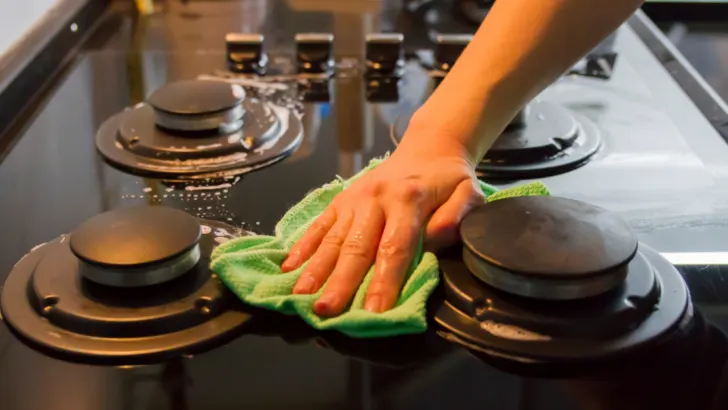
From Bath to Cook – Testing Bathroom Cleaner in the Kitchen
How Bathroom Cleaners Work and How They Can Affect Different Surfaces
Bathroom cleaners work by breaking down and dissolving dirt, grime, and stains. They can be harsh on surfaces and can cause damage if not used properly. For example, acidic cleaners can etch and damage natural stone surfaces, such as marble and granite. They can also damage aluminum and copper surfaces.
Here are some specific examples of surfaces that can be damaged by bathroom cleaner:
- Marble countertops: Acidic cleaners can etch and damage marble countertops, leaving them with unsightly stains.
- Stainless steel appliances: Alkaline cleaners can discolor and damage stainless steel appliances, making them look dull and worn.
- Wood floors: Bleach-based cleaners can damage wood floors, causing them to warp and discolor.
- Plastic surfaces: Enzymatic cleaners can damage some plastics, making them brittle and prone to cracking.
It is important to test any bathroom cleaner in an inconspicuous area first to make sure it does not damage the surface.
Bathroom cleaners can also affect our health if not used properly. They can cause skin irritation, respiratory problems, and eye irritation. It is important to use them in a well-ventilated area and wear gloves and protective eyewear.
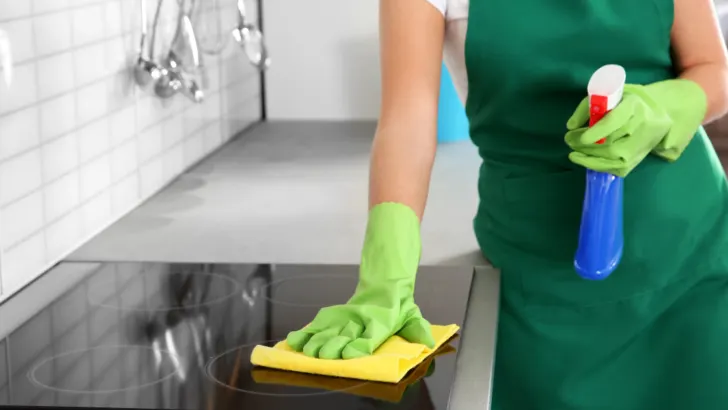
Beyond the Bathroom – Experimenting with Kitchen Cleaners
Here are some additional tips for using bathroom cleaners safely:
- Always read the label carefully and follow the instructions before using any bathroom cleaner.
- Wear gloves and eye protection when using bathroom cleaners.
- Test the cleaner in an inconspicuous area first to make sure it does not damage the surface.
- Do not mix different types of bathroom cleaners together, as this can create harmful fumes.
- Rinse the surface thoroughly after cleaning to remove any traces of the cleaner.
- Ventilate the area well after using bathroom cleaners.
By following these tips, you can use bathroom cleaners safely and effectively.
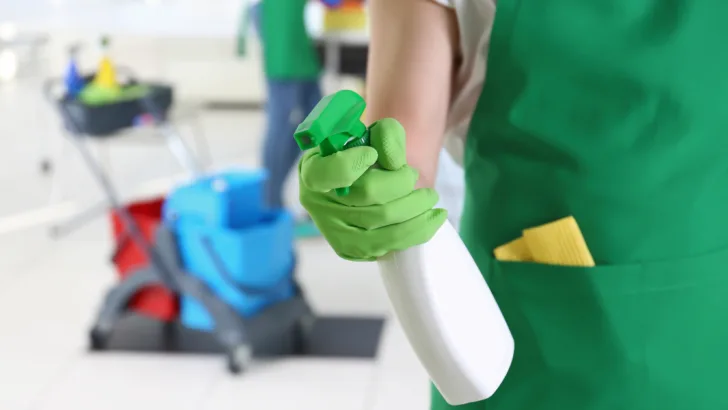
Squeaky-Clean Swap – Trying Bathroom Cleaner in the Kitchen
Identifying the Risks of Using Bathroom Cleaner in the Kitchen
Using bathroom cleaner in the kitchen can be risky, as it contains stronger chemical compounds than kitchen cleaners. These compounds can be harmful if ingested or come into contact with food. For example, bleach-based cleaners can react with acidic foods like vinegar and produce harmful chlorine gas. This gas can cause serious health problems, including respiratory problems, nausea, and vomiting. It is important to keep the kitchen and bathroom cleaners separate and use the appropriate cleaner for each area.
Here are some other risks of using bathroom cleaner in the kitchen:
- It can damage surfaces. Bathroom cleaners are often harsh and can damage surfaces in the kitchen, such as countertops, appliances, and flooring.
- It can make food unsafe to eat. If bathroom cleaner comes into contact with food, it can make it unsafe to eat. This is especially true for bleach-based cleaners, which can react with food and produce harmful chemicals.
- It can be harmful to your health. Bathroom cleaners can contain harmful chemicals that can irritate your skin, eyes, and respiratory system. They can also be harmful if ingested.
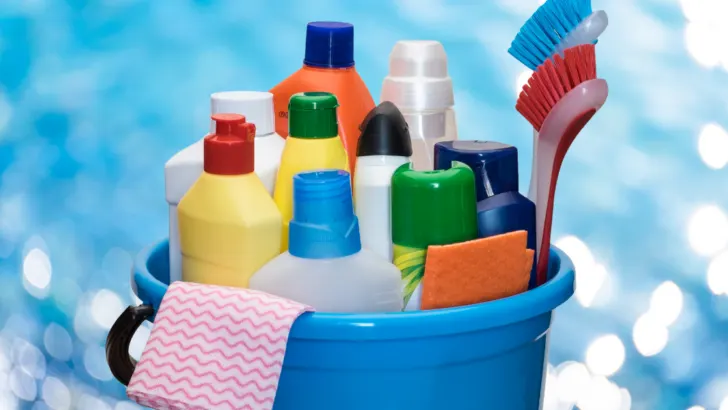
Kitchen and Bath Fusion – A Look at Cross-Usage Cleaners
If you must use bathroom cleaner in the kitchen, it is important to take precautions to protect yourself and your family. Here are some tips:
- Always read the label carefully and follow the instructions.
- Wear gloves and eye protection when using bathroom cleaner.
- Test the cleaner in an inconspicuous area first to make sure it does not damage the surface.
- Do not mix different types of bathroom cleaners together.
- Rinse the surface thoroughly after cleaning to remove any traces of the cleaner.
- Ventilate the area well after using bathroom cleaners.
It is also a good idea to have a dedicated bathroom cleaner that you only use in the bathroom. This will help to prevent cross-contamination between the bathroom and kitchen.
If you are unsure about whether or not it is safe to use bathroom cleaner in the kitchen, it is always best to err on the side of caution and use a kitchen-specific cleaner. There are many safe and effective kitchen cleaners available on the market, so you should be able to find one that meets your needs.
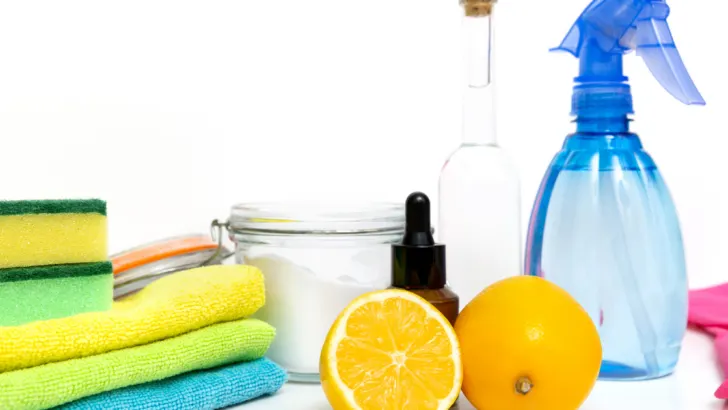
Kitchen Hygiene Hack – Bathroom Cleaner’s Unexpected Role
Looking at Alternative Cleaning Solutions for the Kitchen
There are many alternative cleaning solutions available for the kitchen that are safer and more effective than using bathroom cleaner. These solutions are often natural and affordable, and they can be just as effective as commercial cleaners.
Here are a few popular homemade cleaning solutions for the kitchen:
- Vinegar and baking soda: This is a classic combination that can be used to clean a variety of surfaces in the kitchen. Vinegar is a natural disinfectant, and baking soda is a mild abrasive. To make a vinegar and baking soda cleaning solution, simply mix equal parts vinegar and baking soda together. Apply the solution to the surface you want to clean, and let it sit for a few minutes before scrubbing it away.
- Lemon juice and salt: Lemon juice is a natural disinfectant and degreaser, and salt is a mild abrasive. To make a lemon juice and salt cleaning solution, simply mix together lemon juice and salt until it forms a paste. Apply the paste to the surface you want to clean, and let it sit for a few minutes before scrubbing it away.
- Dish soap and water: Dish soap is a gentle cleaner that is safe for use on most surfaces in the kitchen. To make a dish soap and water cleaning solution, simply mix a few drops of dish soap with warm water. Apply the solution to the surface you want to clean, and scrub it away with a sponge or cloth.
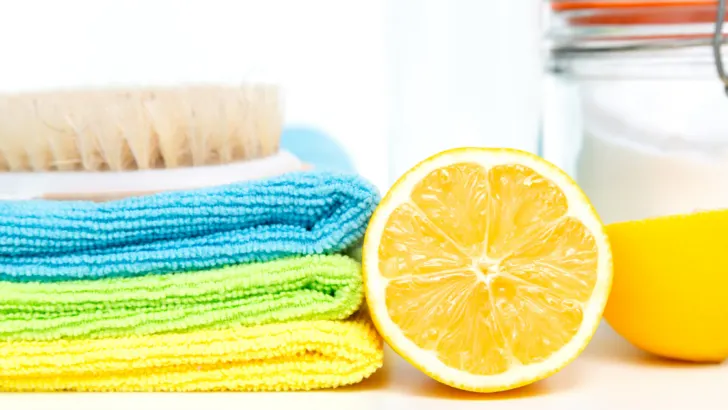
Clean Cuisine – Bathroom Cleaner’s Role in the Kitchen
These are just a few examples of alternative cleaning solutions that you can use in your kitchen. There are many other recipes available online, so you can find one that fits your needs and budget.
It is important to note that homemade cleaning solutions may not be as strong as commercial cleaners, so you may need to scrub a little harder. However, they are still effective at cleaning and disinfecting surfaces, and they are much safer for your health and the environment.
If you are looking for an affordable and eco-friendly way to clean your kitchen, I encourage you to try some of these homemade cleaning solutions. You may be surprised at how well they work!
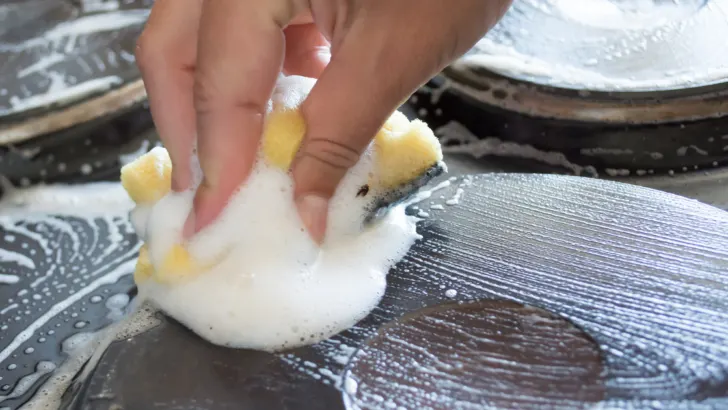
Splash or Scrub: Using Bathroom Cleaner Beyond the Bath
Frequently Asked Questions
Is it safe to use bathroom cleaner on kitchen countertops?
No, it is not safe to use bathroom cleaner on kitchen countertops. Bathroom cleaners are made up of stronger chemical compounds than kitchen cleaners, which can include bleach and ammonia, and can be harmful if ingested or come into contact with food. It is recommended to use kitchen cleaners specifically designed for countertops.
What happens if you use bathroom cleaner in the kitchen?
If you use bathroom cleaner in the kitchen, it can damage surfaces and appliances and may leave a residue that can be harmful if ingested. Bathroom cleaners are not designed for use in the kitchen, and their chemical compositions can be harmful to food and cooking utensils.
Can bathroom cleaner be used to clean kitchen appliances?
No, bathroom cleaner should not be used to clean kitchen appliances. Bathroom cleaners are not designed for use on kitchen appliances, and their chemical compositions can damage the surfaces of appliances. It is recommended to use kitchen cleaners specifically designed for appliances.
Are there any risks to using bathroom cleaner in the kitchen?
Yes, there are risks to using bathroom cleaner in the kitchen. Bathroom cleaners are not designed for use in the kitchen, and their chemical compositions can be harmful to food and cooking utensils. It is recommended to use kitchen cleaners specifically designed for kitchen use to avoid any potential risks.
What are the differences between bathroom cleaner and kitchen cleaner?
The main difference between bathroom cleaner and kitchen cleaner is their chemical compositions. Bathroom cleaners are made up of stronger chemical compounds than kitchen cleaners, which can include bleach and ammonia. Kitchen cleaners are designed for use on kitchen surfaces and appliances, and their chemical compositions are formulated to be safe for food and cooking utensils.
Can you use all-purpose cleaner in both the bathroom and kitchen?
Yes, all-purpose cleaner can be used in both the bathroom and kitchen. All-purpose cleaners are designed to be versatile and can be used on a variety of surfaces, including bathroom and kitchen surfaces. However, it is important to read the label and ensure that the cleaner is safe for use on the specific surface or appliance.
